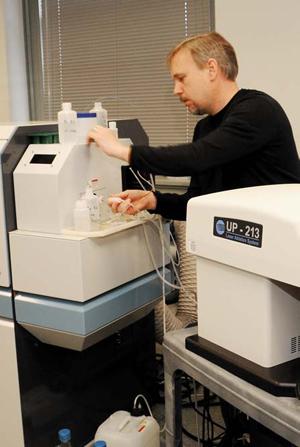Room 224
Steele Building
Giesel School of Medicine at Dartmouth
19 Fayerweather Hill Road
Hanover, NH 03755
(603) 646-1704
Dartmouth Trace Elements Analysis website
Pricing information and sample submission
The Trace Element Analysis (TEA) laboratory specializes in low-level trace metal analysis and speciation in environmental and biological samples. We use inductively coupled plasma mass spectrometry (ICP-MS) for metals analysis and several "hyphenated" techniques that couple instruments together for speciation analyses of water, soil and biological tissue samples.
Leadership
Brian Jackson, PhD
Faculty Director
Research Associate Professor
Department of Earth Sciences
Brian.P.Jackson@Dartmouth.edu
(603) 646-1272
Dr. Jackson's interests are in the biogeochemistry and environmental fate of trace metals in the environment with a focus on human exposure. In particular, Dr. Jackson has focused on the environmental chemistry of arsenic and mercury and in the development of analytical methods for speciation analysis of these elements. Member: American Chemical Society, Geochemical Society.
Tracy Punshon, PhD
Co-Director
Research Assistant Professor
Department of Biological Sciences
Tracy.Punshon@Dartmouth.edu
(603) 646-1037
Dr. Punshon has over 18 years' experience in metal analysis, specializing in elemental imaging via laser ablation ICP-MS and synchrotron X-ray fluorescence.
Services and equipment
Services
Trace metals in solutions, trace metals in solids, Arsenic speciation, mercury speciation, elemental profiling of biological tissue thin sections. Turnaround time is 2-3 weeks depending on batch size and samples analysis type.
The fee-per-service includes analysis of up to 14 elements of the user’s choosing. Please consult with Brian Jackson for more details. In general, ICP-MS is suitable for the quantification of most elements except C, H, O, N, F, and noble gases.
The TEA Core follows the general quality control criteria outlined in EPA SW846. We use a comprehensive suite of NIST standard reference materials and include analysis and digestion duplicates and spikes in each run. Instruments are calibrated for each batch analysis and calibration is verified throughout the run. The TEA Core also participates in external proficiency tests for analysis of blood, serum, urine, and hair 3 times per annum and other external assessments for more specialized analysis such as arsenic speciation in foods and mercury speciation in the water on an annual basis.
Submission
From 8:00 am to 5:00 pm, samples can be dropped off at Steele 224. The sample drop-off sheet should be completed at that time. E-mail Brian Jackson with any questions about the analysis or requests for analysis types not listed above. Results are returned as concentrations of trace elements in the samples as they were supplied to the lab.
Equipment
- Three Inductively Coupled Plasma Mass Spectrometry (ICP-MS) instruments
- Two collision cell quadrupole ICP-MS systems and one high-resolution ICP-MS.
- Laser ablation system (elemental mapping of biological thin sections)
- Liquid chromatography (arsenic speciation) and gas chromatography (mercury speciation)

